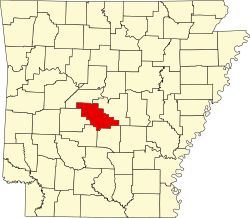Detonti, Arkansas | |
|---|---|
| Coordinates: 34°29′50″N92°30′32″W / 34.49722°N 92.50889°W | |
| Country | United States |
| State | Arkansas |
| County | Saline |
| Elevation | 354 ft (108 m) |
| Time zone | UTC-6 (Central (CST)) |
| • Summer (DST) | UTC-5 (CDT) |
| Area code | 501 |
| GNIS feature ID | 76788 [1] |
Detonti (also De Tonti) is an unincorporated community in Saline County, Arkansas, United States. [1]


